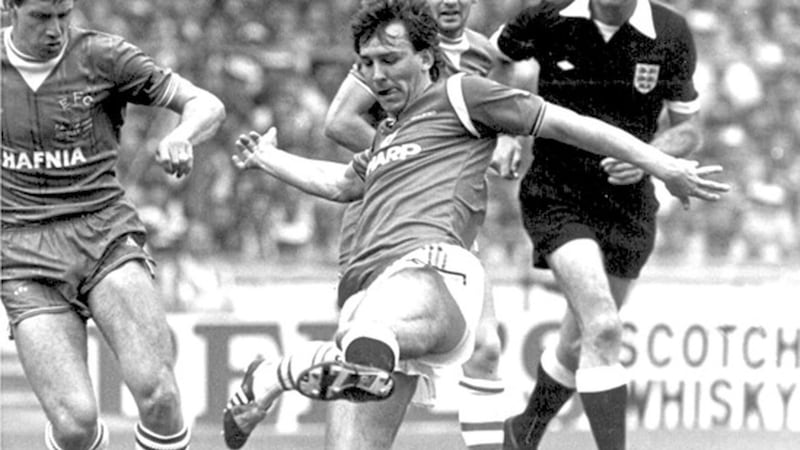WE were at the very back of the Maine Road stand behind one of the goals. I still remember the dusty wooden benches and a quarter of the pitch in the shade from a blinding afternoon sun.
It was Sunday April 8 1990. FA Cup semi-final day. Manchester United versus Oldham Athletic.
Alex Ferguson was hanging on to the United job by the skin of his teeth and Joe Royle had built a brilliant Oldham team that were still in the old English Second Division at the time.
It was probably the game that convinced Ferguson to sign Oldham right back Denis Irwin.
Oldham were a team full of energy and enterprise; United still trying to incorporate a host of new players into the team – Gary Pallister, Paul Ince, Mike Phelan and Neil Webb among them.
It was an exhilarating day in the east end of Manchester. Just to be there, on a dusty wooden bench at the back of a creaking old stand and coping quite admirably with a terrible view of the match.
I remember feeling the fear of God every time Oldham attacked with Andy Ritchie, Rick Holden and Ian Marshall and willing every United attack to end in a goal.
As a kid, I loved Bryan Robson. If you were to build the ideal midfield player, he would look something like the former England captain – and yet he is sometimes overlooked in discussions surrounding the history of great midfielders.
Robson's combative nature and subsequent injuries shaved off some of the best years of his brilliant career – but he still managed to burst through the centre of the Oldham to defence that afternoon to score at Maine Road in what turned out to be an epic, heart-in-mouth 3-3 draw after extra-time.
I would have done anything to stay in Manchester for the next couple of days to attend the replay.
Maybe it was the innocence of youth but the game was at its zenith back then. There were always big guns in football but not the monstrosities that inhabit the game today.
United went on to win the FA Cup semi-final replay with Ferguson asserting afterwards that Oldham were the best team they’d faced all season.
The game was far more competitive back then and therefore a more enjoyable spectacle.
Individuals regularly decided games too, not systems.
In that era, there were many aspects of the game that were generally left uncoached - and it didn’t do anybody any harm. Especially the game.
Spool forward to April 2021 and everyone is breathing a sigh of relief that the European Super League crashed and burned in a dramatic 50 hours that filled the airwaves, millions of newspaper column inches and went viral on social media.
A group of speculators, masquerading as football club owners, saw the promise of billions of euros and reached for them, as any self-respecting rampant capitalist would, in the crudest imaginable way.
As the debate became more hysterical with every Twitter scroll, I was left wondering who on earth would pay to watch the equivalent of the Champions’ League group stages over and over and over again?
It was the reason behind cancelling my BT Sports subscription. Where were these billions coming from if they weren’t coming from the broadcasters?
Or maybe I'm under-estimating the passive nature of consumers – as I sit and call out to Alexa to play another Bruce Springsteen song, thinking: Do I actually need an Alexa?
Do I need Sky Sports? Sky Movies? And Sky Store for more movies? And Premier Sports? And Netflix? And Amazon?
I tally the endless direct debits that politely siphon money from my bank account each month. And I let it happen.
Nowadays, we could quite literally stay at home for the rest of our lives – a bit like the last 12 months – sign for our Amazon boxes and groceries, slam the door shut, gorge on the European Super League and be utterly numbed by the thousandth instalment of Real Madrid versus Manchester United and trick ourselves into believing this is entertainment.
But are we not already tricking ourselves?
We'd like to believe that the European Super League was a bridge too far and that football rediscovered its soul. But the truth is, top level football has been numbing the senses for years.
Has football not toppled from the cliff edge already?
Some of the emotive language, such as Aleksander Ceferin calling people "snakes" suggests that there is some moral high ground to cling to in this debate, while at the very same time UEFA is mulling over expanding its cash cow, the Champions League, to 36 teams and creating 10 rounds of league stage games.
In essence, that's a European Super League in a different guise, albeit with a few bones thrown in the direction of football's lower leagues with promises of more cash.
It all reeks of a power-play between Uefa and many of the top European clubs. While football’s pyramid system suffered a couple of mini earthquakes over the last week, its celebrated pathways to success are becoming more a figment of football’s collective imagination.
As the millions of euros continue to gravitate to the establishment clubs, the game becomes less competitive with each passing season.
There are flashes in the pan in football that are held up as evidence that dreams can come true, but they’ll remain simply that: mere flashes.
You just need to look at the demise of the FA Cup. Nobody cares. Not even the lesser lights who have their heart set on mid-table.
Those dusty wooden benches in old Maine Road. They don’t make cup ties like they used to.






